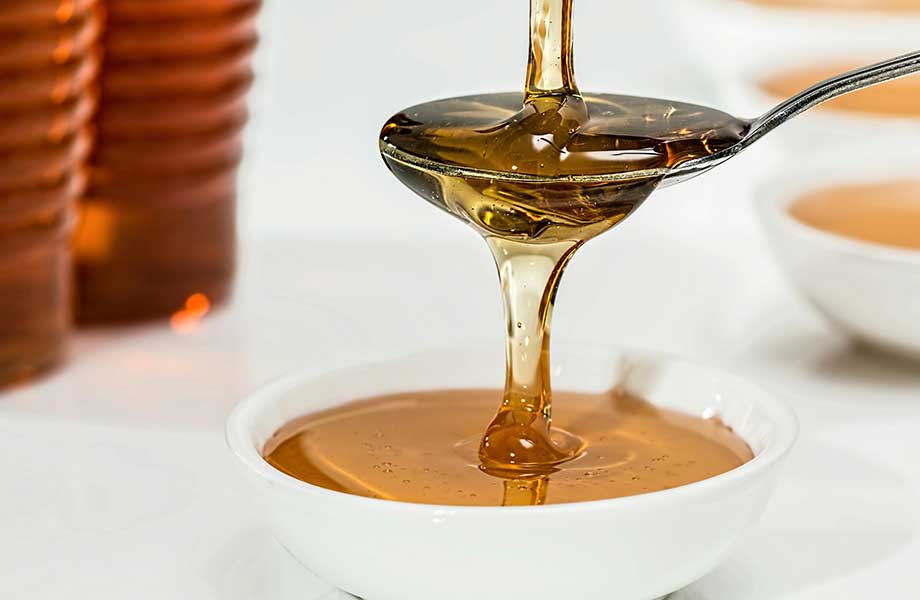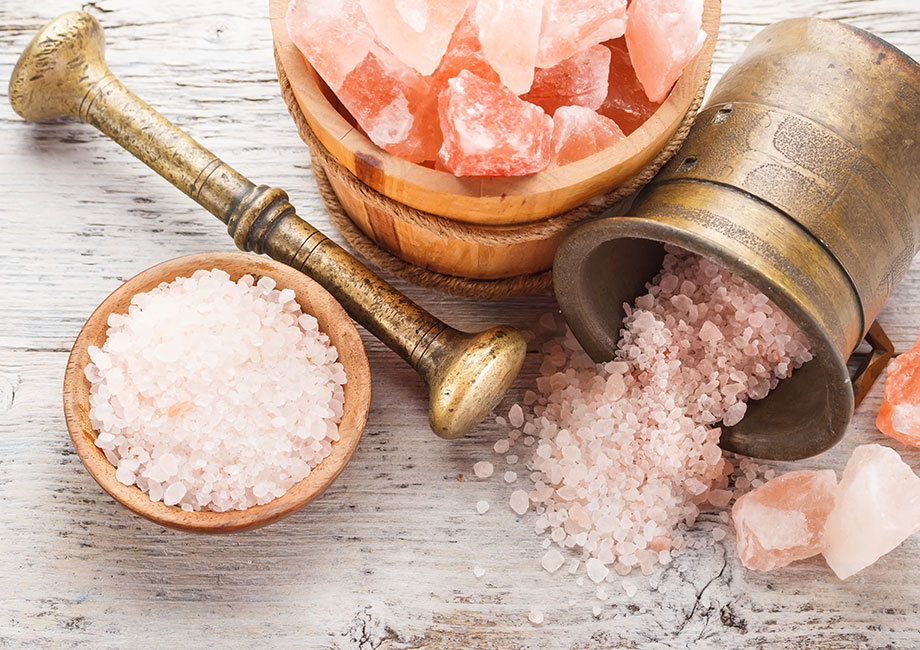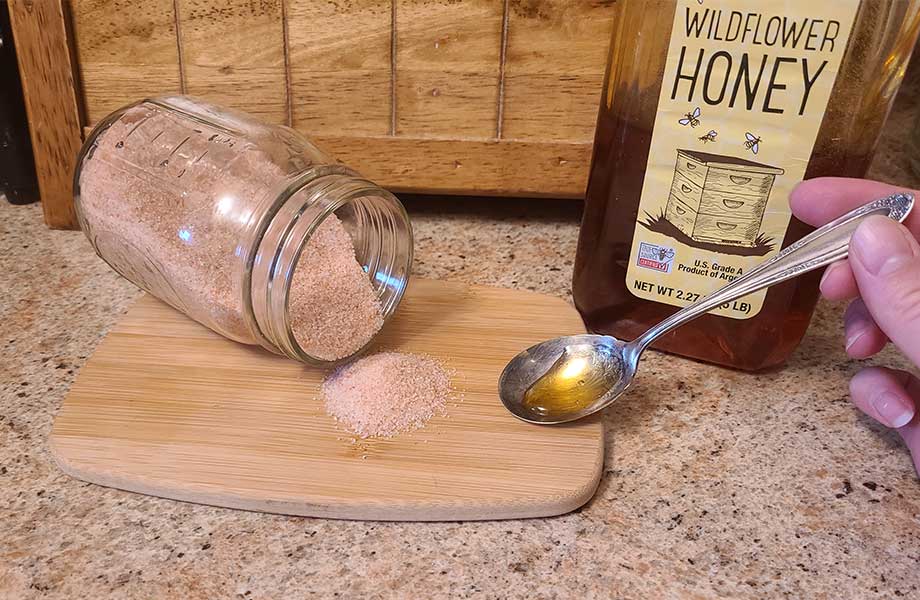We test and review fitness products based on an independent, multi-point methodology. If you use our links to purchase something, we may earn a commission. Read our disclosures.
Have you caught the latest buzz? Honey and salt is the ultimate pre-workout supplement—according to TikTok, that is.
In case you missed it (*raises hand*), TikTokers and fitness enthusiasts are shaking up their pre-workout routines with a spoonful of honey and a pinch of salt—or doing it completely unmeasured. While we are all about learning how to make homemade pre-workouts, this particular blend of sweet and salty is not your typical ingredient list. All this to wonder: Is this honey and salt pre-workout elixir the bee’s knees?
Join me, a registered dietitian nutritionist, as I examine this trendy pre-workout fuel and determine whether it’s worth taking before your next training session. Let’s get into it!
Medical disclaimer: This article is intended for educational and informational purposes only. It is not intended as a substitute for medical advice. For health advice, contact a licensed healthcare provider.
Short Answer: Are Honey and Salt an Effective Pre-Workout?
In theory, honey and salt could enhance your workout. Honey’s natural carbohydrates offer a quick energy boost before exercising, while salt supports electrolyte balance and hydration.
However, in practice, the pre-workout benefits of honey and salt don’t compare to properly formulated pre-workouts with caffeine, nitric oxide boosters, nootropics, and other performance-enhancing components.
Plus, you might’ve already consumed honey and salt pre-workout, albeit with other ingredients. (A bowl of oats drizzled with honey and topped with sea salt, anyone?) The best pre-workout foods include carbohydrates for energy and electrolytes to support hydration.
So, before you neglect your beloved pre-workout snack and adopt the Winnie the Pooh and Salt Bae approach, let’s take a look at what the research shows.
Honey and Salt Pre-Workout: How Does It Work?
While the synergy of honey and salt as a pre-workout duo has yet to be extensively studied, their unique properties could enhance workout performance.
Honey1 is a rich source of carbohydrates, comprising about 80% of its composition from the simple sugars glucose and fructose. Carbohydrates are well-recognized as a crucial source of energy for exercise, and the combo of glucose and fructose may reduce digestive distress and improve exercise performance.
Sports dietitian Destini Moody, RD, head of performance nutrition for the NBA G League Ignite, highlights that a salt pre-workout mainly consists of 40% sodium and 60% chloride, the components of table salt. As an electrolyte2, sodium plays essential roles in muscle contraction, nerve signaling, fluid balance, and temperature regulation—all crucial for effective workouts. So, active individuals benefit from a higher sodium intake than those who are sedentary or have heart conditions.

TikTokers mostly recommend using pink Himalayan salt over regular table salt because of its additional vitamins and minerals—such as calcium, magnesium, and potassium. Yet, as Destini highlighted, no studies confirm its unique performance benefits.
The American College of Sports Medicine3 (ACSM) notes combining carbohydrates (found in honey) with electrolytes (like those in salt) can enhance water absorption, maintain blood glucose levels, and delay fatigue. This is especially true if exercise lasts more than an hour.
So… Any form of simple sugar and salt could theoretically offer these benefits. However, honey’s unique properties provide additional advantages worth considering.
Benefits of Honey and Salt Pre-Workout
Honey and salt pre-workout may support hydration, provide quick energy, and enhance exercise performance, among other potential benefits. Let’s explore these in greater detail.
Supports Fluid Balance and Hydration
Salt is a rich source of the critical electrolyte sodium, which is crucial for regulating fluid balance. Combining carbohydrates with electrolytes can improve water absorption while maintaining optimal blood sugar and sodium levels3. Research4 also indicates that beverages containing carbs and electrolytes enhance the taste and stimulate thirst, which can help encourage more fluid intake.
Provides Quick Energy
Honey is a natural source of carbohydrates, delivering glucose and fructose that the body can quickly absorb. This immediate energy can power muscles before a workout and ensure the body has sufficient energy to sustain exercise activities.

While salt doesn’t supply energy like honey, it’s vital for nerve and muscle function.
May Support Exercise Performance and Recovery
Although carbohydrates are known to enhance athletic performance, the effectiveness of honey as a carbohydrate source is mixed and appears to vary based on the type of training1. One 2019 study5 found that honey doesn’t boost performance in 1,500-meter runners but significantly reduced fatigue markers, and another 2012 study6 observed no performance change after consuming honey before an anaerobic sprint.
However, a systematic review7 suggests that honey could improve aerobic exercise performance. Beyond exercise performance, honey and exercise promote bone health and enhance immune system function, benefiting overall health and wellness.
Could Support Overall Health and Well-Being
Beyond providing carbohydrates, honey contains beneficial amino acids, minerals, polyphenols, vitamins, and around 500 enzymes. These compounds could enhance immunity and aid recovery thanks to their antioxidant, antimicrobial, and anti-inflammatory properties1.
January 2020 research8 indicates honey positively affects bone health, the immune system, reproductive hormones, and inflammatory responses. A 2023 meta-analysis9 also points out that certain types of honey—such as Robinia, clover, and unprocessed raw honey—can enhance glycemic control and lipid profiles as part of a healthy dietary regimen.
However, maintaining a balanced approach is essential, especially since excess sugar, even natural sugars, can contribute to obesity and other chronic health issues. Those with heart issues, osteoporosis, diabetes, or kidney issues should also avoid this salty-sweet combo because sodium can exacerbate these conditions.
Who Should Take Honey and Salt Pre-Workout?
To reiterate, the workout performance and health benefits of honey and salt pre-workout are generalized, and studies lack them working in tandem. While this isn’t to say you can’t participate in this trendy pre-workout regimen (but please see the next section first), certain populations and individuals may benefit the most.
Heavy Sweaters
Sweat rates10 vary from person to person; heavy or “salty” sweaters experience rates exceeding 70 to 80 millimoles per liter (mmol/L), putting them at a higher risk for electrolyte imbalances. Without laboratory tests to confirm these levels, you might identify as a salty sweater if you notice salty residues on your skin or clothing, if your sweat tastes particularly salty, or if it stings your eyes.

For such individuals, pre-workout honey and salt intake can be a preemptive strategy to maintain proper hydration and enhance workout performance.
Endurance Athletes
Endurance nutrition11 is ever-evolving, but high-carbohydrate diets remain a cornerstone since they can provide energy, maintain blood sugar levels, and preserve glycogen stores.
The widespread use of the best running gels, enriched with easily digestible carbohydrates, including simple sugars like glucose and fructose—reminiscent of honey—underscores this point. A review12 also suggests honey can serve as an effective and less expensive source of carbohydrate gel.
Hydration strategies should be highly customized to the athlete’s experience, sweat rate and sodium content, exercise intensity, and environmental conditions. However, sports drinks containing 230 to 690 milligrams of sodium result in optimal absorption and prevent hyponatremia13, a critical condition characterized by dangerously low sodium levels in the blood.
When and How to Take Honey and Salt Pre-Workout
The best way to consume honey and salt before a workout isn’t officially prescribed. Some opt for an informal approach—eyeballing and consuming amounts directly from their hands—but we can guide timing and dosage to optimize results.
To harness honey’s natural energy best, consuming the blend at least 30 minutes before exercising is advisable. Sports nutrition guidelines14 suggest consuming 1 gram of carbohydrates per kilogram of body weight an hour before exercise. Adjusting for 30 minutes pre-exercise, a 150-pound individual (about 68 kilograms) should consume roughly 34 grams of carbohydrates, or 2 tablespoons of honey, since each tablespoon contains 17 grams of carbs.
The ACSM3 advises 500 to 700 milligrams of sodium per liter of water for activities exceeding one hour. Since there are about 2,300 milligrams of sodium in 1 teaspoon of salt, ¼ teaspoon may be a good starting point.
You caught the “per liter of water,” right? While dry scooping pre-workout is not a concern here, hydration remains critical. So, despite the extra effort, mixing honey and salt with water is a practical approach to ensure a less messy and more beneficial consumption method.
TL;DR: Consume honey and salt with water at least 30 minutes before your workout. It is advisable to start with 1 to 2 tablespoons of honey and ¼ teaspoon of salt, adjusting based on personal health and exercise intensity and duration.
Better yet, if truly aiming to maximize your health and fitness, seek guidance from a healthcare professional—especially if you’re managing a medical condition or taking any medications.
Honey and Salt Pre-Workout: Final Thoughts
Honey and salt have rapidly become a natural pre-workout combo on social media. As the trend continues to buzz, here are some final thoughts for practical use and health considerations:
- Effectiveness: While not as powerful as the best pre-workouts, honey and salt can boost energy levels and aid hydration.
- Best candidates: “Salty sweaters” and endurance athletes might benefit most from this pre-workout combo. However, individuals with specific health conditions, such as high blood pressure and diabetes, should proceed with caution.
- Consumption tips: Although many on TikTok prefer to eat this mixture directly from a spoon or their hand, blending honey and salt with water will optimize hydration. Measuring an appropriate serving size based on individual needs is also wise.
Honey and Salt Pre-Workout: FAQs
What is the honey and salt trick?
The honey and salt trick involves consuming a mixture of honey and salt before a workout to quickly boost energy and maintain fluid balance.
What do Himalayan salt and honey do?
Honey’s natural carbohydrates offer a quick energy boost before exercising, while Himalayan salt supports electrolyte balance and hydration. Combining carbohydrates (found in honey) with electrolytes (like those in Himalayan salt) may also improve water absorption and maintain optimal sodium levels in the blood compared to plain water3.
Does honey and salt give you a pump?
Many lifters report a more pronounced muscle pump after incorporating salt into their pre-workout regimen. This is attributed to the potential enhancement of blood flow and a bloating effect in the muscles. Meanwhile, carbohydrates are essential for replenishing muscle glycogen stores, and honey can make muscles appear fuller.
These statements have not been evaluated by the Food and Drug Administration. This product is not intended to diagnose, treat, cure, or prevent any diseases.
References
- Hills SP, Mitchell P, Wells C, Russell M. Honey Supplementation and Exercise: A Systematic Review. Nutrients. 2019 Jul 12;11(7):1586. doi: 10.3390/nu11071586. PMID: 31336992; PMCID: PMC6683082.
- Shrimanker I, Bhattarai S. Electrolytes. [Updated 2023 Jul 24]. In: StatPearls [Internet]. Treasure Island (FL): StatPearls Publishing; 2024 Jan-. Available from: https://www.ncbi.nlm.nih.gov/books/NBK541123/
- American College of Sports Medicine; Sawka MN, Burke LM, Eichner ER, et al. American College of Sports Medicine position stand. Exercise and fluid replacement. Med Sci Sports Exerc. 2007 Feb;39(2):377-90. doi: 10.1249/mss.0b013e31802ca597. PMID: 17277604.
- Park SG, Bae YJ, Lee YS, et al. Effects of rehydration fluid temperature and composition on body weight retention upon voluntary drinking following exercise-induced dehydration. Nutr Res Pract. 2012 Apr;6(2):126-31. doi: 10.4162/nrp.2012.6.2.126. Epub 2012 Apr 30. PMID: 22586501; PMCID: PMC3349034.
- Aly MO, Elgohary R, Tayel DI. The effect of honey supplementation formula on delaying some fatigue markers on 1500 meters runners with no impact on performance. Int J Sports Sci. 2019;9(3):47–53. doi: 10.5923/j.sports.20190903.01.
- Woolfolk KG. Effect of Honey on Anaerobic Performance in Male Collegiate Soccer Players. ETD. 2012. Available at: https://digitalcommons.georgiasouthern.edu/etd/1011
- Yusof A, Ahmad NS, Hamid M.S. A, et al. Effects of honey on exercise performance and health components: A systematic review. Science & Sports. 2018;33(5):267-281. doi:https://doi.org/10.1016/j.scispo.2018.02.007
- Safitri N, Pitriani P, Mulyana M, et al. Effect of Honey on Measurable Sport. Proceedings of the 4th International Conference on Sport Science, Health, and Physical Education (ICSSHPE 2019). Published online January 1, 2020. doi:https://doi.org/10.2991/ahsr.k.200214.094
- Ahmed A, Tul-Noor Z, Lee D, et al. Effect of honey on cardiometabolic risk factors: a systematic review and meta-analysis. Nutr Rev. Published online November 16, 2022. doi:https://doi.org/10.1093/nutrit/nuac086
- Baker LB. Physiology of sweat gland function: The roles of sweating and sweat composition in human health. Temperature (Austin). 2019 Jul 17;6(3):211-259. doi: 10.1080/23328940.2019.1632145. PMID: 31608304; PMCID: PMC6773238.
- Vitale K, Getzin A. Nutrition and Supplement Update for the Endurance Athlete: Review and Recommendations. Nutrients. 2019 Jun 7;11(6):1289. doi: 10.3390/nu11061289. PMID: 31181616; PMCID: PMC6628334.
- Kreider RB, Rasmussen CJ, Lancaster SL, et al. Honey: An Alternative Sports Gel. SCJ. 2002;24(1):50.
- Knechtle B, Chlíbková D, Papadopoulou S, et al. Exercise-Associated Hyponatremia in Endurance and Ultra-Endurance Performance-Aspects of Sex, Race Location, Ambient Temperature, Sports Discipline, and Length of Performance: A Narrative Review. Medicina (Kaunas). 2019 Aug 26;55(9):537. doi: 10.3390/medicina55090537. PMID: 31455034; PMCID: PMC6780610.
- Ormsbee MJ, Bach CW, Baur DA. Pre-exercise nutrition: the role of macronutrients, modified starches and supplements on metabolism and endurance performance. Nutrients. 2014 Apr 29;6(5):1782-808. doi: 10.3390/nu6051782. PMID: 24787031; PMCID: PMC4042570.
Further reading

Improve the strength and definition of your legs with the oft-forgotten and neglected leg press workout. A certified personal trainer shows you how. Read more

Is this popular protein powder worth the hype? Find out with our Myprotein The Whey Review. Read more

Rows, deadlifts, snatches, pull-ups…some weightlifting straps can do it all, but which are the top dogs? Check out our picks for the best lifting straps. Read more

Have you caught the latest buzz? Honey and salt is the ultimate pre-workout supplement—according to TikTok, that is. In case you missed it (*raises hand*), TikTokers and fitness enthusiasts are shaking up their pre-workout routines with a spoonful of honey and a pinch of salt—or doing it completely unmeasured. While we are all about learning how to make homemade pre-workouts, this particular blend of sweet and salty is not your typical ingredient list. » Read more about: Honey and Salt Pre-Workout: Is It the Bee’s Knees? A Dietitian’s Take » Read more

